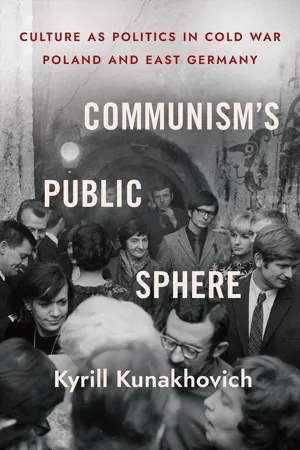
Communism's Public Sphere
Culture as Politics in Cold War Poland and East Germany
- 354 pages
- English
- ePUB (mobile friendly)
- Available on iOS & Android
About this book
Communism's Public Sphere explores the political role of cultural spaces in the Eastern Bloc. Under communist regimes that banned free speech, political discussions shifted to spaces of art: theaters, galleries, concert halls, and youth clubs. Kyrill Kunakhovich shows how these venues turned into sites of dialogue and contestation. While officials used them to spread the communist message, artists and audiences often flouted state policy and championed alternative visions. Cultural spaces therefore came to function as a public sphere, or a rare outlet for discussing public affairs.
Focusing on Kraków in Poland and Leipzig in East Germany, Communism's Public Sphere sheds new light on state-society interactions in the Eastern Bloc. In place of the familiar trope of domination and resistance, it highlights unexpected symbioses like state-sponsored rock and roll, socialist consumerism, and sanctioned dissent.
By examining nearly five decades of communist rule, from the Red Army's arrival in Poland in 1944 to German reunification in 1990, Kunakhovich argues that cultural spaces played a pivotal mediating role. They helped reform and stabilize East European communism but also gave cover to the protest movements that ultimately brought it down.
Frequently asked questions
- Essential is ideal for learners and professionals who enjoy exploring a wide range of subjects. Access the Essential Library with 800,000+ trusted titles and best-sellers across business, personal growth, and the humanities. Includes unlimited reading time and Standard Read Aloud voice.
- Complete: Perfect for advanced learners and researchers needing full, unrestricted access. Unlock 1.4M+ books across hundreds of subjects, including academic and specialized titles. The Complete Plan also includes advanced features like Premium Read Aloud and Research Assistant.
Please note we cannot support devices running on iOS 13 and Android 7 or earlier. Learn more about using the app.
Information
Table of contents
- Acknowledgments
- Abbreviations
- Introduction
- 1. Takeover: Reconstruction as Revolution
- 2. Planning: Workers and Cultural Mass Work
- 3. Nationalism: Public Protest and the Birth of National Communism
- 4. Pluralism: Individual Choice and Public-Opinion Polling
- 5. Consumerism: Cultured Consumption and Its Limits
- 6. Reform: The Promise and Peril of Controlled Revolt
- 7. Dissent: Normalization and Its Discontents
- 8. Protest: Spaces of Opposition, Spaces of Dialogue
- Epilogue
- Notes
- Bibliography
- Index